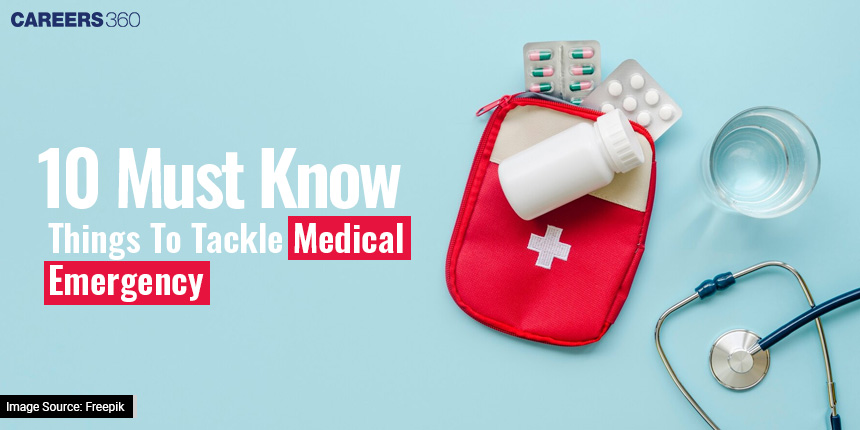10 Things Your Teen Should Know About Dealing With Medical Emergencies
Medical emergencies can happen at any time and at any place. Being prepared to respond effectively and quickly in such situations is vital. Though it's usually an adult’s responsibility to take charge it's quite important to make your teen “emergency ready.” Being prepared in such situations can prove to be a lifesaver in critical situations. Keeping our young readers ready for any difficult situation that they may face, Careers360 has listed 10 basic things every teenager must know if they or someone who they know are facing a medical emergency.

Recognising an Emergency
The first step in handling an emergency is remaining calm and alert in the given situation. Every parent should teach their child to recognise the signs of an emergency, whether it is breathlessness, bleeding, vomiting, dizziness or any other symptom they may perceive as “not normal.” They must learn to trust their instincts.
Whom To Call For Help
This is as important as recognising the emergency. Whom should they call for help? Doctors, house help, relatives, neighbours, family friends. People who can respond quickly and calmly to the child’s call for help. It's important that your teen is aware of the medical emergency helpline numbers. They should know how to convey details with clarity so that adults can work quickly in getting the necessary aid. Keep your family doctor, paediatrician and local hospital numbers handy so that your kid can help you and themselves during a medical emergency.
Informing About Medical History
As a child, it is not expected that they know about their or their parents’ complete medical history, but it is important for parents to have healthy and clear conversations on these topics. The teen should know if their parent has any chronic condition like asthma, diabetes, or high or low blood pressure.
Basic First Aid
Every teen should know how to provide basic first aid. This could help reduce the intensity of medical emergencies. This may include stopping bleeding, what to use in case of burns, or electric shocks etc. Other than keeping a first aid box at home, empower your child with knowledge on how to use it. Hands-on experience with the first aid kit can boost the confidence of the child facing a medical emergency.
Also check-Parent-Child Relationships: A Foundation For Your Successful Future
Handling Burns
Burns and scalds are the most common medical emergency that demands instant care. Parents should teach their teenage children how to treat kitchen cuts and burns. Basic response like cooling down the affected area with cold water and not with ice. Children should be told to not use viral hacks such as putting cream or butter or covering the wound area with a cloth and seek medical attention as soon as possible.
Allergic Reactions
Parents should always tell their teen children about the things they are allergic to. Allergic reactions can be caused by anything from medicine, pollen, insects, food etc. The child should be aware of some of the basic symptoms of allergic reactions like runny nose, frequent sneezing, swollen throat, and hives on the body. These are some of the mild signs of allergic reactions. In this case, a doctor-prescribed anti-allergic medicine will work. But if the teen observes symptoms like vomiting, swollen tongue, signs of anaphylaxis such as difficulty breathing, swelling of the face, and a rapid pulse an immediate medical intervention is needed.
Also Check- Why ‘Play’ Is Important In Child Development
Recognising Signs of a Stroke
Strokes can happen at any age and at any time. But recognising the early signs of stroke is vital. Teenagers need to remember the FAST acronym which stands for: Face drooping, Arm weakness, and Speech difficulty so it's Time to call an ambulance. Making teenagers understand that their quick response can save a life is basically empowering them with the confidence that they can actually do it.
Providing Emotional Support
It is usually the parent who is expected to be the pillar of strength, but during emergency situations, even children can be supportive of their parents. During a medical emergency, you may require this support and if your child can be mature enough to provide it, you have done a good job at parenting.
Create an Emergency Plan
A demo emergency plan should always be ready. The teen should know what is the first thing to do in case of a medical emergency. The responsibilities can range from calling the ambulance, administering first aid, and gathering essential documents like insurance information and medical history.
Teaching a teenager how to handle medical emergencies is an important life skill. Training them for such situations enables them to respond effectively during crucial moments. Preparation and education on how to react to such situations will help them face tough times with clarity and calmness.
Applications for Admissions are open.
As per latest syllabus. Physics formulas, equations, & laws of class 11 & 12th chapters
JEE Main Important Chemistry formulas
Get nowAs per latest syllabus. Chemistry formulas, equations, & laws of class 11 & 12th chapters
JEE Main high scoring chapters and topics
Get nowAs per latest 2024 syllabus. Study 40% syllabus and score upto 100% marks in JEE
JEE Main Important Mathematics Formulas
Get nowAs per latest syllabus. Maths formulas, equations, & theorems of class 11 & 12th chapters
